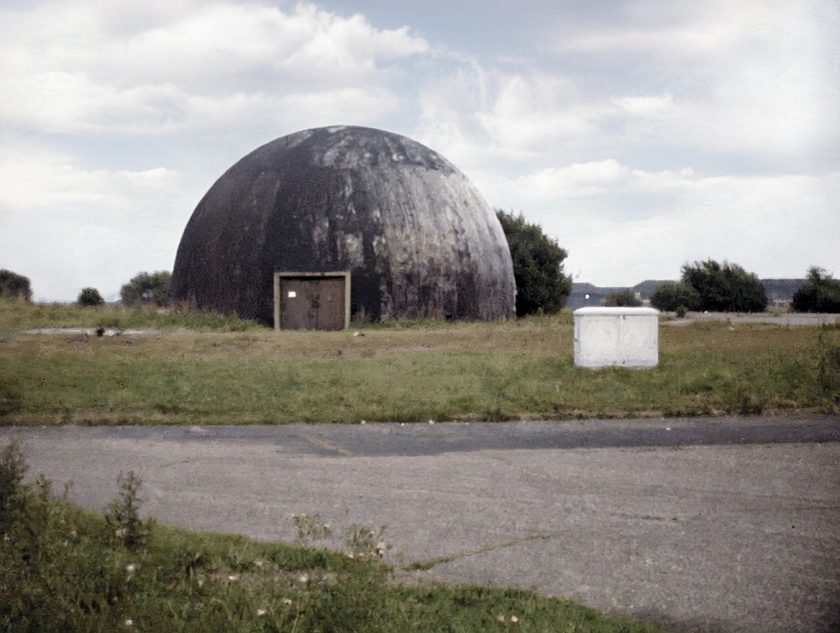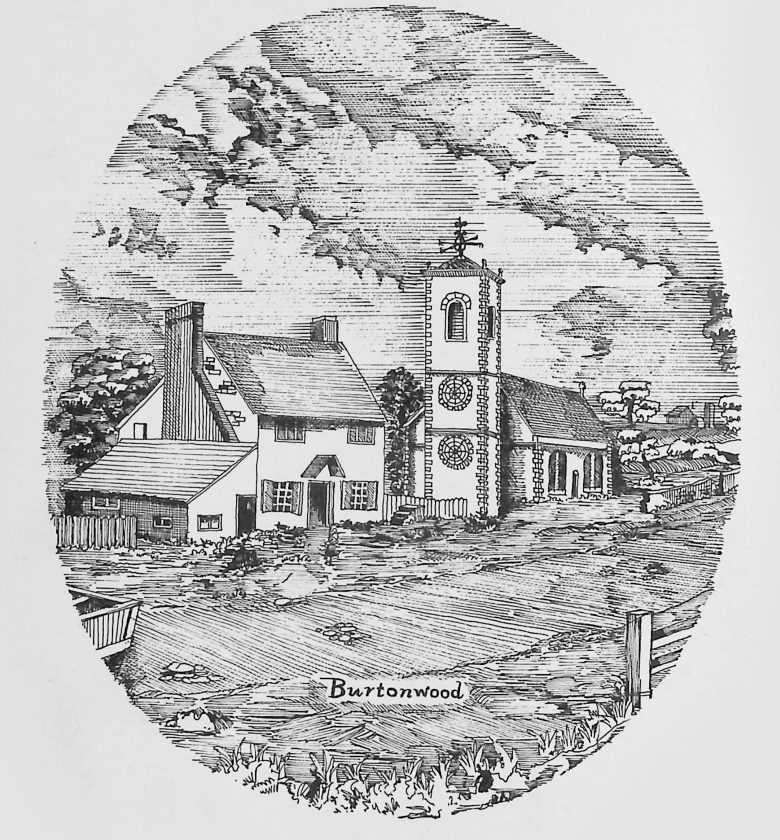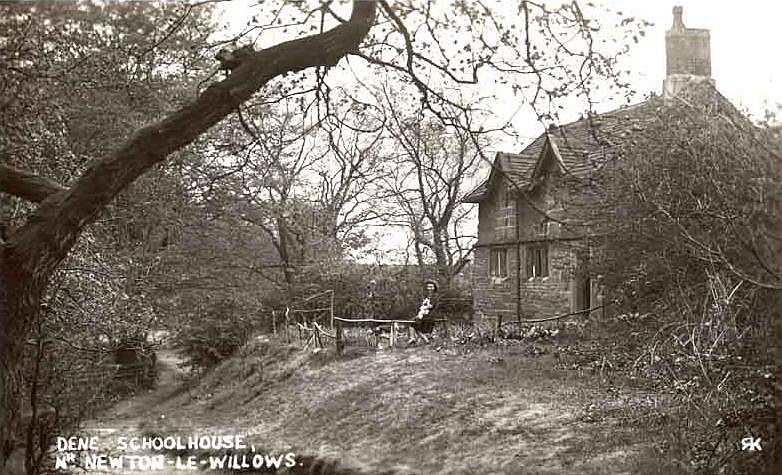THE JOCKEYS.
cant remember the names of all the jockeys who rode at Newton in those far-off days, but I do remember Tom Cannon, Kempton Cannon, Tommy Loates, Sammy Loates, Jack Watts, Fred Allsop, Jimmy Fagan and Johnnie Osborne. Honest John as he was often called. Fifty years ago, Johnnie Osborne was nearing his end as a jockey, for he was close on forty years of age. Some forty years after, at the age of eighty-two, he trained and rode in its mornings gallop, The Guller, winner of the Chester Cup. I have it on reliable authority that Johnnie Osborne never missed attending a place of worship on the Sabbath, if it was at all possible. For years he attended Holy Communion at St. Johns Church, Earlestown.
I wonder what the race-going public of to-day would think if the jockeys of to-day grew side-whiskers. Johnnie had a very prominent set. He was very popular as a model for us school lads to draw on our slates. I dont think there was a lad in the school who couldnt draw Johnnie Osborne. He often rode the winner of the last race at Newton. A thorough gentleman both on and off the turf.
I cannot leave the jockeys without mentioning the name of the most famous jockey the world has ever known, Fred Archer. He did ride at Newton, I believe, but I dont recollect him and, as I am only writing pen pictures as I saw them, I am sorry I cannot tell you anything about him riding at Newton. He rode and won the Newton Cup on Anchorite, so I was informed, and he also rode sixteen winners out of twenty races in one week. Poor Fred Archer, he met an untimely end.
There was always plenty to pass your time away on the course, even if you did not back horses. Any amount of small, gambling things you could have a go at. One would have small seive erected on the angle and you had to throw a marble into it. You had three tries for a penny, and you got threepence back if you threw one in. It was no trouble to throw the marbles in it, the trouble was getting them to stay in. It wasnt as easy as it looked; yet there was a way of getting them in. The seive being tight, if you hit the hair part at all, outs would bounce the marble. To win you had to hit the inside of the rim at the top very hard so that the marble would then hit the inside of the bottom of the rim, bounce a bit and then settle in the seive. This was another game in which you were told to take a walk when the proprietor could see you could do it.
The seive game was a game of skill, but I cannot say that of the next show to it, for if ever there was a swindle, this was one. It consists of a small goal post about twelve inches wide and about nine inches high. From the crossbar hangs a small wooden ball tied on a string; then there is a wooden cone about three inches high, two inches diameter at the bottom and tapered to a point. You take the ball, then let it swing past the cone, but you must knock it down with the ball as it swings back. A penny a try, and you get threepence back if you knock the cone down. To draw you on he lets you have a try for nothing and, of course, you are successful, simply because he has set the cone out of centre. You then put your penny down, he puts the cone on the centre; which puts paid to your penny. You go very close to knocking it down, I admit, and to keep you at it he sets it at intervals (but very rare) so that you can knock it down. When its on the centre theres nothing doing. While we are having a go at these different games the atmosphere is disturbed by cries of:
“A WELSHER!”
I dont suppose these gentry are often met with nowadays, but I have seen a few dealt with at Newton. A genuine “welsher” is a man who will take all the bets he can procure and has not the least intention of paying out. More often than not, it was on the last race it used to occur. He would call slightly better odds than the other bookies, consequently receiving more bets.
Now, I will only take the case of one “welsher ” among many I saw during the twenty-five years of racing. Polly Duck was the favourite for this particular race, and it was one of those favourites that all Earlestown knew about. It started at six to four on, and this bookie was shouting, ” Ill take five to four,” and he took some money, I can tell you, far more than his book could stand. He was ” sweating ” on the favourite getting beaten, but it didnt. It was he who was beaten. In this case it happened to be the last race, and as soon as the horses entered the straight it was as if all the bookies and backers shouted at the top of their voices, “A million to one on Polly Duck.” While the excitement was at its height this ” welsher ” made a bolt for it, or rather was going to bolt, but it didnt come off. The odds he had shouted roused the suspicions of several who had backed with him, and I can tell you they didnt let the ball come out of the pack. His card-board frame was bashed over his head, umbrella torn into shreds, hard hat split in two, stand broken, and he was made into a rag shop in no time. There was no money in his satchel, for his clerk had very cunningly made good his escape with the dough.
After handling the bookie in such a manner and making him so mucky, it was only natural he would require a bath, which the enraged backers saw that he got. Down to the pit he was dragged, and as far as two hefty men could throw him, into the pit he went ; then was left to get out the best way he could. You must draw your own conclusions how the ” welsher ” derived his name. I have my own opinion, and I think he would have had a different calling than a ” welsher ” if he had been called a ” scotcher.” Bookmakers, even in those days, were looked upon by some folk, as men who were out for all the money they could get, which is quite true, yet I would like you to know that I dont think there is a more generous set of men in any other calling. Never be afraid of asking a bookmaker for a donation in the cause of religion or charity.
“LEAVING THE COURSE.”
We will now leave the course, as the last race is over, and what a rush there is; oh yes, they could get a move on with horses and cabs in those days. When I went to Chester last Cup Day I saw hundreds of motor-cars and coaches, yet not a solitary horse, but when I was rushing off Newton Race Course there was not a solitary motor-car or coach. Wouldnt there be a contrast in the two pictures? In the old days at Newton were vehicles of almost every description. Hansom cabs, four-wheelers, dog-carts, wagonettes and Irish jaunting-cars, all drawn by horses, and there were some good animals amongst them. I believe Manifesto, the winner of one of the Grand Nationals, was picked out from amongst the horses that worked between race course and station.
The horse-drawn vehicles coming from the races made a far prettier and more interesting picture than the present-day cars would make. I think so at any rate, and I have seen both. No variety could I see at Chester ; the cars looked just like a lot of creeping cockroaches and all alike ; whereas at Newton, besides the many different shapes of things on wheels, you could see far more variety in the animal world than ever paraded Rotten Row. That can be easily understood, as Newton Races only came once a year, and every animal that could drag anything on wheels was brought out, to help to keep the snow off the roof. I have seen heavy cart horses drawing dogcarts, and Shetland ponies drawing wagonettes; mules pulling hansoms and donkeys in the shafts of four-wheelers; to say nothing of seeing a worn-out racehorse in the shafts of a heavy coal-cart which carried ten men besides the driver. The horse looked a bit on the thin side, I admit, but that was on account of its breed, and as it was hot weather and nobody buying coal, what was the use of the cart lying idle?
I think the most comical turnout I recollect was a large wagonette, which ought to have been drawn by four horses in place of which were a very tall, thin horse and a little fat donkey. Besides being able to count every rib of the horse, you could hang your hat on the hip bones. It was thin, and I well remember us lads shouting, ” Old tin-ribs.” I will now take you over to



